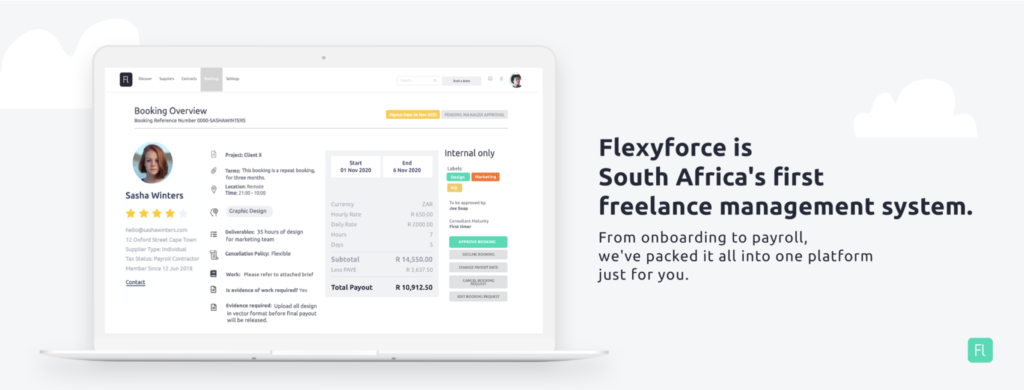Dawn of the Cloud-Sourced Economy:
The Rise of Freelance Management Systems
Accelerated by the pandemic, 2020 has seen a rise in the Freelance economy, the adoption of cloud software systems and an increasing demand for freelance management systems.
Spurred on by mass retrenchments as well as increased caution around fixed overheads, the gig economy is booming in South Africa.
South Africa’s record unemployment rate of 30.1% and rapidly shrinking GDP, is fuelling a move towards low-cost and on-demand operating models. It is pushing the freelancer economy, or gig economy, from the sidelines to the mainstream.
In addition, recent research from Gartner confirms that 32% of organisations say they plan to replace full-time employees with freelance workers as a cost-saving measure.
For example, at Flexyforce, we’ve seen the pandemic really push companies out of their comfort zones into the cloud. Interestingly, many are starting to view an on-demand workforce through a different lens. A lens of increased bottom lines.
Outsourced, agile suppliers is vital in helping businesses stay nimble in times of crisis. And those businesses who fail to embrace this new trend to cut costs and thrive, will find themselves at risk of staying alive.

The end of work as we know it
Former New Yorker editor Tina Brown coined the term “gig economy” in 2009. It described how workers were pursuing “a bunch of free-floating projects, consultancies, and part-time bits and pieces while they transacted in a digital marketplace.”
In a 2018 survey of 6,500 executives worldwide, conducted by BCG, roughly 40% of respondents said they expected freelance workers to account for an increased share of their organization’s workforce over the coming five years. And 50% agreed that corporate adoption of gig platforms would be a significant trend.
The COVID-19 crisis is playing an instrumental role in fast-tracking this trend. Remote, flexible working has fast become an inextricable part of the ‘next normal’.
Furthermore, Harvard Business Review estimates the pandemic could prove to be a pivotal point in the “gigification” of knowledge work.
We’ve seen a major shift towards the use of outsourced suppliers and service providers. With a 30% increase in the uptake of our freelance management system since April 2020.
Interestingly, we’ve especially noticed an uptick of this trend among marketing and advertising agencies, as the industry is heavily disrupted by budget cuts and the days of big retainers are long gone.
Work has shifted to a project based business model, forcing agencies to review their current business models and exchange current fixed cost models for ever more remote and on-demand business operations.
Addressing a major lack of visibility and tax compliance through freelance management systems
Managing a freelance workforce comes with significant challenges for project/traffic managers within organisations. For example, One of the most common problems arising from on-demand workforce management is a lack of visibility and ensuring tax compliance.
A lack of visibility can lead to organisational inefficiencies including higher costs and freelance tax administration can be admin intensive and frequently misunderstood. Unfortunately, COVID-19 has further highlighted these blind spots.

This is an issue we are actively solving via our freelance management system flexyforce.com. We help companies organise, contract and pay their suppliers, consultants, contractors & freelancers – all in one place. Flexyforce is the first freelance management system of its kind in South Africa and ensures that companies are tax compliant. Flexyforce will help business owners and project managers across the country gain 100% visibility of their suppliers and contingent workforces, while remaining tax compliant. All in one place.
Looking ahead
Businesses have a unique opportunity. To expand, they get to revisit their talent strategies while they navigate the current changes in the work ecosystem. Ultimately, the move to an on-demand workforce is accelerating. Therefore, businesses will need to implement freelance management systems to more effectively manage a growing external workforce.
We are moving into a new world of work. It is time to reframe and appreciate what opportunities can come out of a crisis.
One such opportunity is to harness a cloud-based database of all your independent suppliers. It could mean your entire company has access to the on-demand resources the company has onboarded and used. Organisations that use the right technology, will be better positioned to weather future disruptions to the way we work.
Although much is uncertain in our post-COVID-19 realities, one thing remains clear. The future of work is remote, outsourced and cloud-based.
